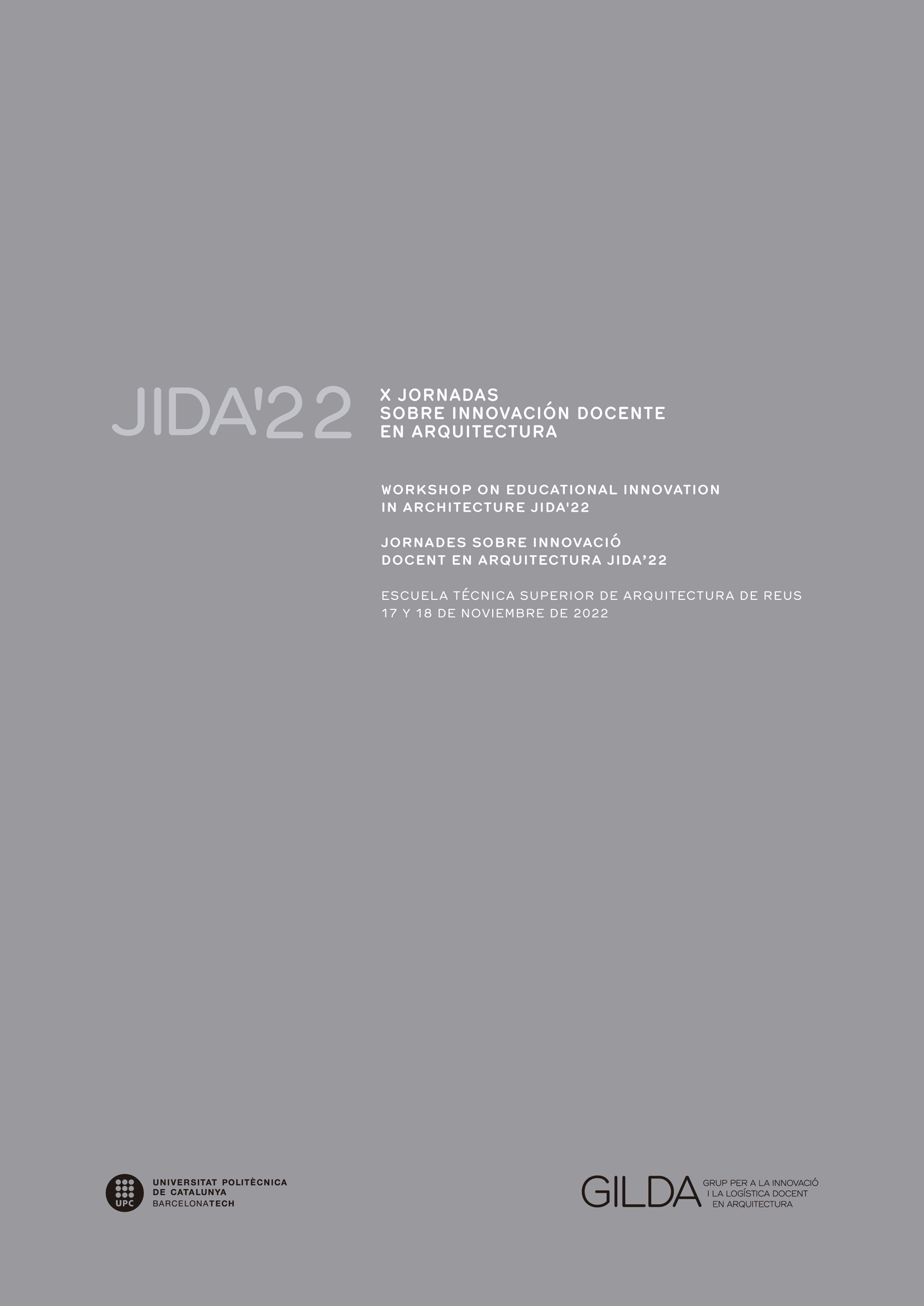Narrative inquiry as a form of research of the design studio
DOI:
https://doi.org/10.5821/jida.2022.11651Keywords:
narrative inquiry, design studio, pedagogical relation, student voice, storiesAbstract
The following text is part of the results of a dissertation in Education about teaching and learning in the design studio. It is taken as a dynamic structure that links tradition, normative and institutional provisions, the design process, and the study of some educational models, but, above all, it focuses on the relationship between its main actors: students and teachers. Narrative inquiry is taken as the methodological path to acquire these experiences through conversations that focused on relational issues, ways of teaching and learning, the architectonic space as a learning scenario, institutional conditions, and satellite experiences. The findings allow us to establish a current and future overview of the successes and issues to be improved in the learning experience and the design studio become meaningful.
References
ARENTSEN MORALES, E. (2019). “El taller de arquitectura más allá del enfoque tradicional de Donald Schön. JIDA. Barcelona. UPC. Disponible en <https://upcommons.upc.edu/handle/2117/171542> [Consulta: 20 de marzo de 2021]
AUSTERLITZ, N. y ARAVOT, I. (2007). “Emotions of architectural students: A new perspective for the design studio”. En Salama, A & Wilkinson, N (Eds.), Design studio pedagogy: Horizons for the future, p. 233-246. The Urban International Press.
BARNES, B.J.; WILLIAMS, E.A. y ARCHER, S.A. (2010). “Characteristics that matter most: Doctoral students’ perceptions of positive and negative advisor attributes”. Nacada Journal, 30(1), p. 34-46.
CHASE, S.E. (2018). “Narrative inquiry: Toward theoretical and methodological maturity”. The Sage Handbook of Qualitative Research, 5.
CLANDININ, D.J. (2006). “Narrative inquiry: A methodology for studying lived experience”. Research Studies in Music Education, 27(1), p. 44-54.
DEWEY, J. y SÁENZ OBREGÓN, J. (1990). Experiencia y educación. Biblioteca Nueva.
GRANADOS-MANJARRÉS, M. (2021). “Creatividad y estrategias didácticas para la práctica académica del ejercicio proyectual”. Tesis doctoral. Universitat Politècnica de València. <https://doi.org/10.4995/Thesis/10251/172233> [Consulta: 18 de abril de 2022]
GUEVARA ALVAREZ, O.E. (2013). “Análisis del proceso de enseñanza aprendizaje de la Disciplina Proyecto Arquitectónico, en la carrera de Arquitectura, en el contexto del aula”. Tesis doctoral. Universitat Autònoma de Barcelona. <https://hdl.handle.net/10803/116191> [Consulta: 4 de septiembre de 2018]
HIDALGO BURNEO, D. (2020). “El taller de arquitectura,¿ vieja innovación o culto a la tradición?”. Revista HACHE, 5, p. 23-36.
LARROSA, J. (2009). “Experiencia y alteridad en educación”. In C. Skliar & J. Larrosa (Eds.), Experiencia y Alteridad en Educación, p. 13-44. Homo Sapiens.
MAZZEO, C. y ROMANO, A.M. (2007). La enseñanza de las disciplinas proyectuales: hacia la construcción de una didáctica para la enseñanza superior. Nobuko.
PORTERO TRESSERRA, M. y CAMPOS CALVO-SOTELO, P. (2018). “Arquitectura, neurociencia y educación”. Revista Latinoamericana de Políticas y Administración de La Educación, 9, p. 149-165. <http://revistasuntref.com.ar/index.php/relapae/article/view/167> [Consulta: 17 de julio de 2022]
RIVAS FLORES, J.I. (2012). “La investigación biográfica y narrativa: el sujeto en el centro”. II Congreso Internacional Sobre Aprendizaje Permanente. Competencias Para Una Formación Crítica: Aprender a Lo Largo de La Vida, 81.
SCHÖN, D.A. (1992). La formación de profesionales reflexivos: hacia un nuevo diseño de la enseñanza y el aprendizaje en las profesiones. Centro de Publicaciones del Ministerio de Educación y Ciencia y Ediciones Paidós Ibérica, S.A.
SIMMONDS, R.P. (1978). “Learning to learn and design: the development of effective strategies in a graduate school of architecture”. Massachusetts Institute of Technology.
TEYMUR, N. (2011). “Aprender de la educación en arquitectura”. DEARQ-Revista de Arquitectura/Journal of Architecture, 9.



















